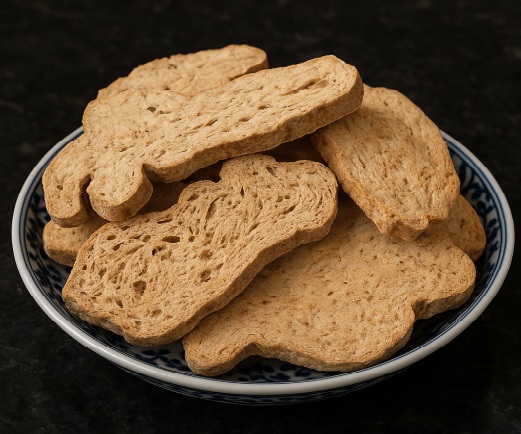Atractylodes Macrocephala Rhizome

Atractylodes Macrocephala Rhizome (Bai Zhu): A Qi-Tonifying Herb for Digestion, Dampness, and Spleen Support
Introduction
Atractylodes Macrocephala Rhizome, known as Bai Zhu (白术) in Traditional Chinese Medicine (TCM), is a foundational herb used to tonify Spleen qi, dry dampness, and stabilize the body’s internal environment. Sweet, slightly bitter, and warm, Bai Zhu is widely used for digestive issues, fatigue, fluid retention, and to strengthen overall energy. Its ability to support both digestion and fluid metabolism makes it essential in countless classical and modern herbal formulas.
What Is Atractylodes Macrocephala Rhizome?
Bai Zhu is the dried rhizome of Atractylodes macrocephala, a perennial plant native to China. In TCM, it is classified as bitter, sweet, and warm, and it enters the Spleen and Stomach meridians. Traditionally, Bai Zhu is used to tonify Spleen qi, dry internal dampness, calm the fetus, and stop spontaneous sweating. It plays a central role in treating qi deficiency and fluid imbalance.
Health Benefits of Atractylodes Macrocephala Rhizome
Tonifies Spleen Qi and Improves Energy
Used for fatigue, poor appetite, loose stools, and weakness caused by Spleen qi deficiency.
Dries Dampness and Resolves Water Retention
Effective for edema, bloating, and sluggish digestion due to damp accumulation.
Stabilizes the Exterior and Stops Spontaneous Sweating
Helps prevent qi leakage from the surface, especially in chronic deficiency syndromes.
Calms the Fetus and Prevents Miscarriage
Used in pregnancy to address threatened miscarriage related to Spleen deficiency.
Enhances Qi-Tonifying Formulas
Strengthens and harmonizes other herbs in formulas such as Si Jun Zi Tang or Shen Ling Bai Zhu San.
How to Use Atractylodes Macrocephala Rhizome
In Decoctions for Fatigue or Dampness
Use 6–12 grams with herbs like Fu Ling, Ren Shen, or Chen Pi. Simmer for 30–45 minutes.
In Spleen and Qi-Tonifying Formulas
Commonly found in formulas for digestive disorders, chronic illness recovery, or loose stools.
In Powder or Capsule Form
Available in qi-tonic blends or digestive support supplements.
Where to Buy Atractylodes Macrocephala Rhizome
- You can find Bai Zhu at the following places:
- Chinese herbal medicine shops
- Digestive health and TCM-focused apothecaries
- Online retailers such as iHerb, Amazon, or Chinese herb suppliers
Look for:
- Pale yellow to tan rhizome slices with a slightly earthy scent
- Wildcrafted or organically grown Bai Zhu preferred for potency
- Unprocessed (raw) or stir-fried forms depending on the formula’s focus
Are There Any Side Effects?
Bai Zhu is generally safe and well tolerated. Overuse may cause dryness or constipation in sensitive individuals. It should be used cautiously in cases of yin deficiency with heat signs. Avoid during early pregnancy without practitioner guidance.
Conclusion
Atractylodes Macrocephala Rhizome, or Bai Zhu, is a core herb in TCM for strengthening digestion, resolving dampness, and boosting qi. Whether used for fatigue, bloating, or long-term qi deficiency, its gentle warming nature and digestive support make it an invaluable part of a balanced herbal regimen.
FAQs
Can I take Bai Zhu every day?
Yes, it is often taken daily in tonic formulas for energy and digestion, especially under professional guidance.
What does Bai Zhu taste like?
It has a slightly sweet, earthy, and mildly bitter flavor with a warm undertone.
Is Bai Zhu safe for children?
Yes, in adjusted doses, Bai Zhu is often used for pediatric digestive issues like loose stools or poor appetite under supervision.

